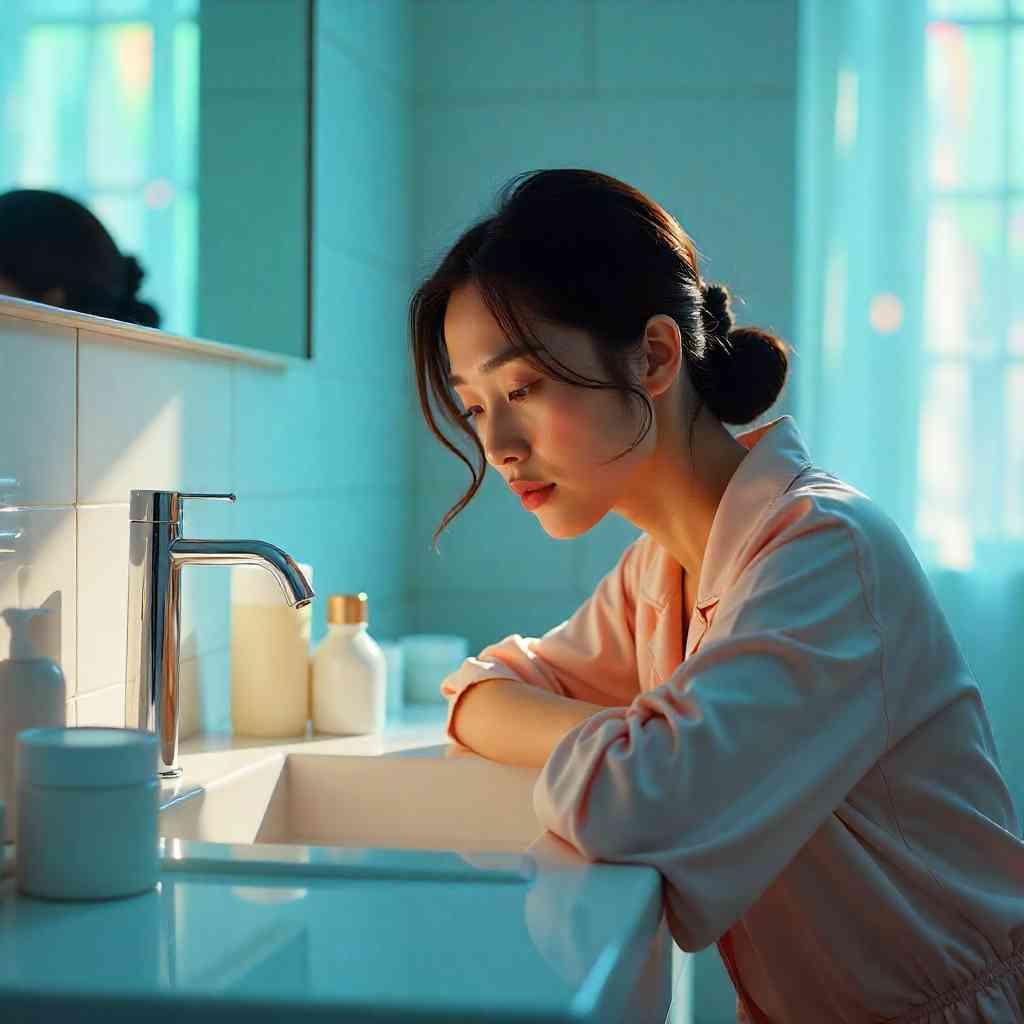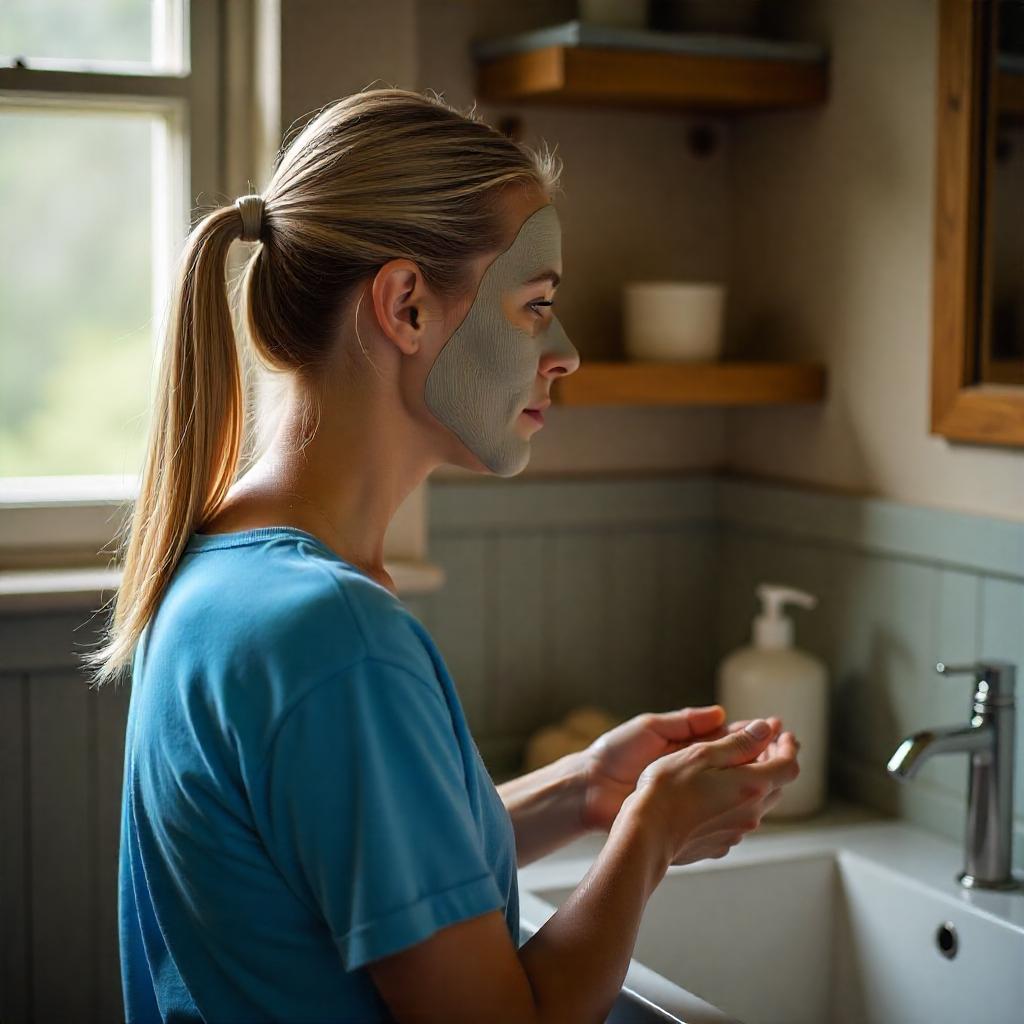Skinminimalism in 2025: Using products that do more than one thing to keep your skin healthy every day

A woman with dark hair, looking weary, slumped against a sink in a brightly lit bathroom, wearing a silk pajama set, surrounded by open jars and tubes of skincare creams, during a sunny morning.
Alt Description-A young woman, exhausted, sitting on the edge of her bed in a dimly lit bedroom at twilight, wearing a white cotton t-shirt and messy bun, surrounded by skincare products on a cluttered vanity.
Alt image-Extensive skincare can exhaust people.
Skinminimalism is a more down-to-earth, stripped-down approach to skincare that has replaced the well-known 10-step K-beauty routines in recent years. This way of thinking isn't just a fad on TikTok or a style on social media. It shows a bigger change in how people shop: they want skincare that is simple, clear, and works without having to use a lot of products.
Skinminimalism has become both a beauty trend and a way of life choice as 2025 goes on. It stresses doing more with less, using fewer but smarter products, and knowing what your skin really needs. Let's talk about what skinminimalism is, why it's becoming more popular, and how you can use it without losing results.
What is skinminimalism?
Skinminimalism means using fewer, more versatile, and essential products that really meet your skin's needs to make your skincare routine easier. Instead of following every new trend or launch, it focusses on consistency, fixing barriers, and making smart choices about ingredients.
The goal isn't just to cut down on steps; it's also to bring things back into balance. Skinminimalism doesn't want you to use harsh exfoliants or blindly layer serums on your skin. Instead, it wants you to pay attention to your skin and respond gently.
Why is Skinminimalism so popular in 2025?
Skinminimalism has become more popular in recent years for a number of reasons:
1. Customers are tired of complicated routines.
The rise of skincare influencers and the constant release of new products has left a lot of people confused and tired. Using seven different actives without any direction has hurt the skin's barriers, made it more sensitive, and overloaded it with ingredients.
2. More and more people are becoming aware of how important it is to keep your skin barrier healthy.
People now know how important barrier repair is because of dermatologists and science-based creators on sites like Instagram and YouTube. Skinminimalism helps the skin's protective layer heal and stay healthy by getting rid of products that are too harsh or not needed.
3. The Factor of Sustainability
Using fewer products means less packaging, less trash, and a smaller carbon footprint. Conscious beauty shoppers now look for brands that sell products that are simple, can be refilled, or can be used in more than one way.
4. Things to think about financially
Minimalism is a smart choice for your wallet as prices go up around the world. You don't have to buy separate serums, moisturisers, and treatments as much when you use multipurpose products.
5. Move Towards Natural Beauty
More and more people are accepting their natural skin, flaws, texture, and all. Skinminimalism says that real skin is better than filtered skin, which gives users the power to focus on health instead of perfection.
Main Ideas of Skinminimalism
Skinminimalism doesn't mean you should stop taking care of your skin. It's about making your routine better on purpose. Here are the main ideas:
1. Only use what you need
Look at your skin every day. Do you really need to exfoliate today? Or is a basic cleanser and moisturiser enough?
2. Buy things that can be used for more than one thing.
Look for products that do more than one thing, like a moisturiser with antioxidants or a serum that hydrates and exfoliates at the same time.
3. Be steady, not too much
Instead of following trends or changing products every week, stick to a simple routine for at least 6–8 weeks before checking to see how well it works.
4. Listen to what your skin is telling you.
If your skin is red, flaky, or stinging, you are doing too much. Skinminimalism says to pay attention to what your skin tells you.
The Best Skinminimalist Routine
Based on your skin type, here's what a skinminimalist routine might look like:
For skin that is normal to dry:
A soft cleanser
Optional: a hydrating toner or mist
Moisturiser with sun protection factor
PM:
Cream cleanser
Moisturiser that repairs the barrier (with ceramides, niacinamide, or peptides)
For skin that is oily or prone to acne: AM:
Cleanser with salicylic acid (if you can stand it)
Moisturiser that is light and has SPF
PM:
Water or gel cleanser with micelles
Serum with niacinamide and zinc
Moisturiser in gel form
Once or twice a week (for all types):
A gentle exfoliant, like PHA or a low % AHA/BHA
A mask for moisturising or soothing inflamed skin
This basic structure keeps the number of products low while still meeting basic skin care needs like cleansing, protection, hydration, and gentle renewal.
The Best Ingredients for a Skinminimalist Routine
Not all ingredients are the same. Every ingredient has to matter when you use fewer products. Here are some great multitaskers:
Niacinamide
It makes the skin brighter, less inflamed, controls sebum, and helps the skin barrier. Works well on all skin types.
Ceramides are important for keeping the skin's natural barrier strong, which keeps moisture in and irritants out.
Squalane
An oil that is light and won't clog pores, but will keep your skin hydrated. Good for skin that is dry and sensitive.
Cica, or Centella Asiatica
A plant that calms the skin and makes it less red and irritated. Great for skin that is sensitive or reacts easily.
Panthenol, also known as vitamin B5, keeps skin moist and helps wounds heal. Helps keep things soft and flexible.
Zinc
Often used on skin that is prone to acne to cut down on inflammation and the growth of bacteria.

A middle-aged Caucasian woman with blonde hair pulled back in a ponytail, wearing a blue t-shirt, applying a clay mask in a rustic bathroom with wooden shelves and soft, diffused lighting, during a cloudy afternoon.
The Benefits of Embracing Skinminimalism
You don't have to give up results to make your skincare routine easier. In fact, a lot of people find that cutting back on their use of it makes their skin healthier over time.
1. Better function of the skin barrier
Using fewer products means less damage to your skin's natural ecosystem, which makes it smoother and less inflamed.
2. Less acne
Removing layers of ingredients that don't work well together lowers the risk of acne flare-ups and clogged pores.
3. Cost-Effectiveness
You save money by buying fewer, more useful items and not buying too many treatments that you don't need.
4. More time and peace of mind
No more 10-minute layering sessions in the morning and at night. Skinminimalism helps you make fewer decisions.
5. Simple but customisable
Skinminimalism doesn't mean that everything is the same. You can still customise it to fit your needs, but you'll have to do it more carefully.
Skinminimalism Myths
Let's get rid of some of the confusion:
"Skinminimalism is only for people with flawless skin."
No, that's not true. This method works especially well for skin that is damaged, reactive, or prone to acne and can't handle too many active ingredients.
"It's not working."
Not how many products you have, but how consistent and good they are, is what matters for effectiveness. You don't need five serums to get results.
"It's boring or simple."
A simple routine can still feel luxurious and fun if you use rich textures, elegant formulations, and meaningful rituals.
Brands at the Forefront of the Skinminimalism Trend
A few skincare companies are getting on board with skinminimalism by making products with few ingredients that do a lot of different things. Here are some important examples:
The Ordinary: Affordable serums that focus on one ingredient
CeraVe makes moisturisers and cleansers that help protect the skin.
Paula's Choice: smart formulas that use effective actives in simple combinations
Minimalist (India) – serums and moisturisers that are clear and have few ingredients
Dr. Sam's Skincare was made by a dermatologist and has products that can do more than one thing.

Last Thoughts
Skinminimalism isn't just a fad; it's a return to what skincare should have always been: careful, planned, and focused on long-term health instead of instant satisfaction. In a world where new products are always coming out, companies make big promises, and there are too many choices, using fewer, smarter products can help your skin and give you peace of mind.
Skinminimalism tells you to slow down and listen to your skin, whether you're new to skincare and don't know what to choose or you're a fan who's tired of having too many products on your shelf. Sometimes, less really is more.